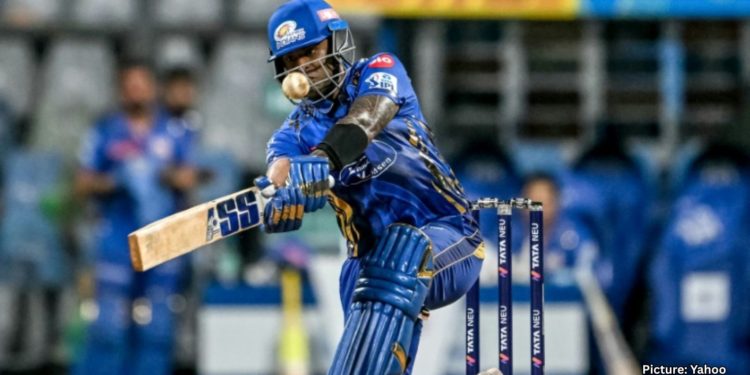GT has emerged victorious in each of their four home matches against MI in the IPL. It speaks volumes about their skill and strategy, as it is not an easy feat to consistently defeat a well-established T20 team. Particularly noteworthy is GT’s ability to devise effective methods to outplay their counterparts from the western region of India.
In IPL 2023, GT claimed victory in four out of seven Ahmedabad matches when batting first. Despite the challenge of dew, they took advantage of an early opportunity for fast bowlers, led by Mohammed Shami. Notably, their triumphs against MI were achieved on red-soil pitches where they dominated with scores above 200 and used the new ball to their advantage while defending. The reason GT could play this way was due to MI lacking a player like Jasprit Bumrah or any other quick bowler who could capitalize on these conditions.
In their first season, GT claimed the title and nearly repeated the feat the following year. However, in 2024, MI swooped in and took away their captain Hardik Pandya. They also constructed a team packed with power hitters, including a fit Bumrah. In response, GT changed up their strategy and played on a lower scoring pitch. This decision proved successful as they were able to defend a total of 168 with the help of bowlers Rashid Khan, R Sai Kishore, and Mohit Sharma.
As their fourth meeting against MI loomed at home, discussions arose about the pitch choice. While Captain Shubman Gill claimed it wasn’t targeted towards the opposition, Assistant Coach Parthiv Patel revealed during a brief interview that facing MI on a black-soil pitch was a deliberate decision. This move would not only level the playing field by minimizing the impact of Trent Boult and Deepak Chahar’s skill with the new ball, but also remove the advantage of familiarity that MI has with red-soil pitches at Wankhede.
Upon further inspection, it was discovered that GT’s style of play is better suited for under-200 matches rather than the 240 match they ultimately fell short in against PBKS. Their lineup boasts Jos Buttler, a highly effective anchor batter in T20 cricket, and B Sai Sudharsan, who excels during the powerplay and can also hold down the middle overs. With a strong batting core, they have the ability to adapt to challenging pitch conditions.
GT stands out for their tall, into-the-pitch fast bowlers who possess the ability to utilize varying pace and bounce on a surface. The field resembled the renowned grounds of the 2023 ODI World Cup final, with a similar playing style that evoked memories of tall bowlers successfully stifling batters. Although, it is worth mentioning that this was solely achieved by Mumbai Indians and not by any other Indian team.
In addition to showcasing GT’s ability to secure victories on their home turf, this latest triumph highlighted the strong partnership between the franchise and the ground authorities. With T20 matches being relatively brief, even minor occurrences such as a wet ball resulting in a six that clears the stadium can greatly affect the outcome. Therefore, to strive for consistent success, it is crucial to capitalize on the advantage of playing on one’s home ground.
CSK, a consistent team at the IPL playoffs, owes their success to their impressive home record – winning twice as many matches as they lose. In comparison, KKR’s dominant performance was largely due to the advantage of utilizing spinners on low-scoring pitches at home. RR’s legendary captain Shane Warne quickly established Sawai Mansingh Stadium as a formidable ground for his team during the inaugural IPL season, winning all seven home matches. Therefore, it is not surprising that GT has also emerged as a strong team in a short period of time, boasting the second-best overall win-loss ratio at their home ground.
The presence of excessive dew and small grounds has hindered MI and RCB from fully capitalizing on their home advantage. Despite this obstacle, MI’s achievement of winning five titles remains remarkable. On the other hand, teams that do not have a consistent home ground face difficulties in assembling a team suited for particular conditions, often leading to their struggle in the IPL.
Unusual occurrences have been observed in IPL 2025. Both CSK and KKR have expressed dissatisfaction with the curators at Chepauk and Eden Gardens, who are not helping them fully utilize their home field advantage. Despite preparing for sub-200 scores to benefit their spinners, the pitches have not cooperated. Adding on to this, there is turmoil within the Rajasthan Cricket Association and the Jaipur stadium, which is under government control and therefore not well-maintained year-round. As a result, RR has been forced to play some of their matches away from Jaipur, losing out on their home base and favorable playing conditions.
In cricket, home advantage is a strategic advantage, especially considering the significant impact conditions can have on the game. This makes winning away particularly noteworthy. However, the IPL presents a different scenario. Unlike traditional teams that maintain their grounds year-round, IPL franchises are merely temporary tenants for a few months. As such, they cannot expect the same level of cooperation from the groundsman as a Ranji Trophy team might receive. It is well within the groundsman’s rights to request that teams choose their players based on overall conditions. Their intention is not to disadvantage the home team; they simply dislike having to alter the nature of the playing surface.
Having a management and team leadership that can foster strong relationships with both the state association and ground staff is crucial. The fact that CSK’s state association and IPL franchise have a strong connection makes their situation even more intriguing. Keep an eye on Eden Gardens and Chepauk during upcoming games. Additionally, take note of GT’s use of varying soils for different teams. It’s likely that CSK will not receive the black soil.


















